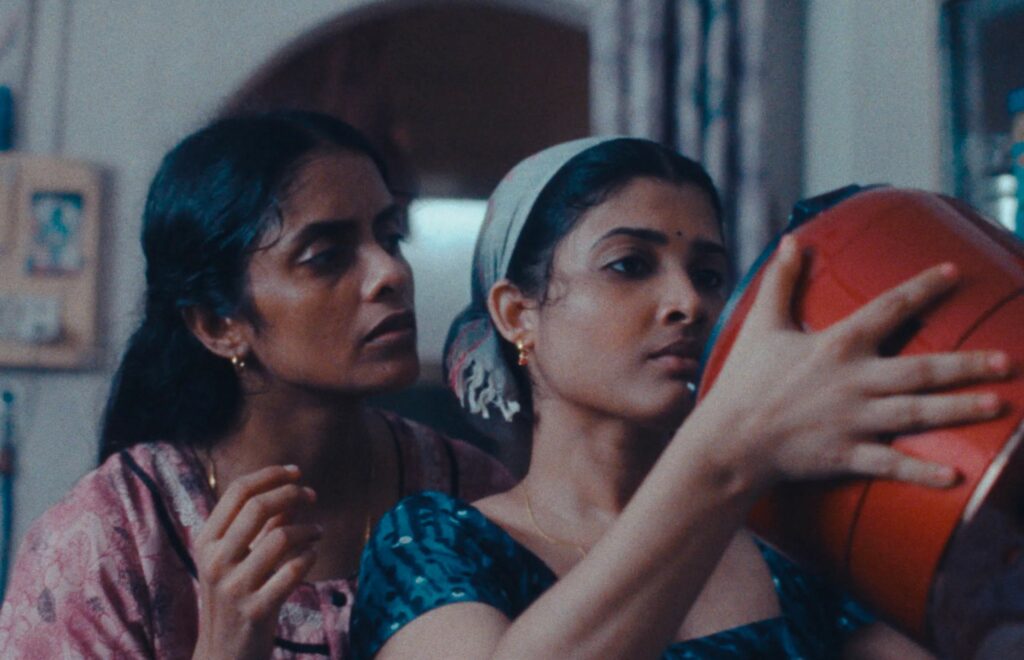Mumbai has not only been one of the most featured cities in Indian films but it is also explored as a subject over the decades. Many a times, the dark underbelly of the city is brought to light. Filmmaker Payal Kapadia’s worldwide acclaimed feature film debut All We Imagine As Light (Malayalam along with some usage of Hindi and Marathi) also shows the bitter side of Mumbai. But it, for a change, doesn’t feature the criminal side of the city in any way.
Kapadia has captured Mumbai in a different manner. Almost the entire portion taking place in Mumbai is shot at night and that too during monsoon rains. No, the rain is not romanticized in the film. It is, instead, shown as a hurdle to the lower middle-class of Mumbai.
Along with that, the city is shown suffering from a cramped space. So, we see both the interiors and exteriors filled with people with hardly any sequence showing a character or two in a space that is even remotely empty. At the same time, the characters too are somehow struggling to find a space of their own in this city, both mentally and physically.
Prabha (Kani Kusruti), a Malayali from Kerala, works as a senior nurse in a hospital and stays in a small space with her junior Anu (Divya Prabha), who hails from the same state. Prabha got married to a man without even knowing him and he soon migrated to Germany.
Anu, a carefree young girl, is in a relationship with Shiaz (Hridhu Haroon). She knows that her parents would never agree for their marriage as he is a Muslim. The couple is always in search of some space to spend time together. Parvaty (Chhaya Kadam), who cooks in the same hospital and hails from Ratnagiri, is struggling to save her little house from a powerful builder.
The above story about two migrants and one semi-migrant isn’t told in a conventional fashion at all. In fact, the film is more about a realistic passing glimpse into their lives with the city being present in most of the film’s duration. The conversations are real but at the same time interesting and, at times, hilarious. The film indicates that the chaos in the city is of the same nature as in the hearts of the characters.
Kapadia has succeeded in displaying her talent in capturing raw reality of Mumbai and the three protagonists. At times, this is visible in small instances, like Prabha hugging the pressure cooker sent by her husband. The topic of religion between Prabha and Shiaz is dealt in a very subtle manner. This part of the film somehow takes a stand against the theories of ‘Love Jihad’, without spelling it out whatsoever.
The three main actors, whose choices have been apt, don’t seem to be acting. Hence, it’s impossible to choose the best of all. Kani Kusruti expresses the pain of loneliness without saying much. Divya Prabha succeeds in being bold and at the same time innocent. Chhaya Kadam naturally switches between helplessness and toughness. Hridhu Haroon makes good of whatever opportunity he gets.
The technical aspects like cinematography and editing also play a major role in keeping the narrative realistic. The background score is used rarely and this works in the film’s favour.
Ideally, the subject and its treatment didn’t deserve a runtime of 118 minutes. It could have been shorter and still made an impact. The back story of Prabha about her husband leaving for Germany needed more clarity, especially considering that he sent that modern pressure cooker to her all the way from there.
Overall: All We Imagine As Light is a poignant portrayal of the lower middle-class of Mumbai through the lives of three women with different personalities and life stories. The film has achieved glory internationally and it deserves to be seen on the big screen.
Rating: 4 out of 5
Director: Payal Kapadia
Producer: Thomas Hakim and Julien Graff
Writer: Payal Kapadia
Cast: Kani Kusruti, Divya Prabha, Chhaya Kadam, Hridhu Haroon
Also read: Indi(r)a’s Emergency review: Shows the period’s relevance today
